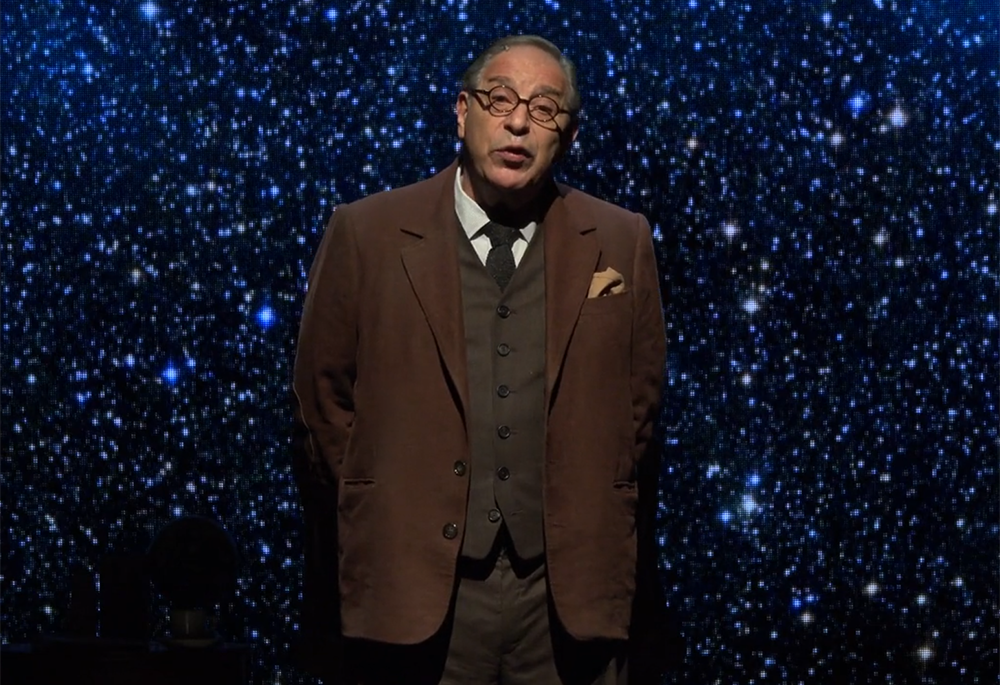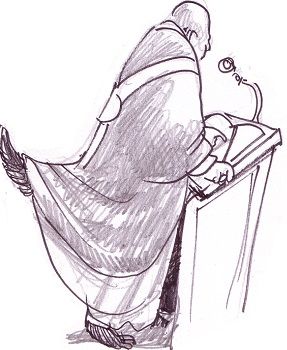
Stars and planets swoop across a black backdrop, the stars gradually spinning into the faint shape of an enormous eye. A middle-aged C.S. Lewis, played by award-winning actor Max McLean, sits in his comfortable study. A bottle of Port wine rests on a buffet table. A small model of a lion perches on a stack of books. Lewis greets the audience, then dives straight into pondering the origins of the universe.
So opens McLean’s latest play about the beloved Christian apologist, « C.S. Lewis on Stage: Further Up & Further In. » The 90-minute, one-man play was written and performed by McLean and produced by Fellowship for Performing Arts, or FPA, a New York City production company that creates drama from a Christian worldview. McLean, who has already adapted several of Lewis’ works for the stage, is FPA’s founder and artistic director. « Further Up & Further In » debuted in Dallas in October and will appear in cities across the U.S. through April 2023.
There are two possible explanations for the universe, Lewis tells the audience. The materialist explanation, which says matter is all that exists and can account for everything that happens, and the religious explanation, which says the universe was created by a being outside the material world. Lewis staunchly favors the latter. But as a former atheist, he takes the possibility of materialism seriously.
Those familiar with Lewis’ work will recognize this opening monologue from the pages of Mere Christianity, Lewis’ best-selling book based on his radio addresses during World War II. In fact, devotees of Lewis could play a game while watching the play: Who can identify the most references to Lewis’ oeuvre? Even the images splashed across the backdrop are recognizable. Here is the modest kitchen in The Kilns, the Oxford home where Lewis lived with his older brother, Warnie. Here are the grounds of Magdalene College, where Lewis taught medieval and Renaissance literature.
The play is a standalone sequel to McLean’s previous production, « C.S. Lewis on Stage: The Most Reluctant Convert, » which recounts Lewis’ conversion to Christianity. « The Most Reluctant Convert » was so well received as a play, McLean turned it into a movie released in 2021. The movie is available to watch on Amazon, Apple TV and other streaming services.
« Further Up & Further In » picks up where « The Most Reluctant Convert » ended. The play aims to tell the story of how Lewis went from a respected but little-known scholar at Oxford University to one of the most beloved Christian thinkers of the 20th century. If that storyline is a bit thin, the play more than makes up for it by the uncanny performance of McLean as Lewis and the absolute delight of hearing Lewis’ words performed onstage.
« Further Up & Further In » is less an origin story and more a drama of ideas. And no wonder, since in writing the play, McLean drew directly from Lewis’ work, including bestsellers like The Problem of Pain, Mere Christianity and God in the Dock. At one point Lewis looks up from his desk to tell the audience what has become a famous quote: « Pain is God’s megaphone to rouse a deaf world. » At another point, he articulates the popular liar, lunatic or Lord argument. And in a particularly tender scene, Lewis recounts a passage about Jill and Aslan from The Chronicles of Narnia (Lewis says he doesn’t think the Narnia books will amount to much, and the audience laughs).
Lewis relates how the popularity of The Problem of Pain, his slim book about evil as an objection to the existence of a benevolent God, led to his invitation to speak about Christianity on the BBC during World War II in a series of addresses unoriginally titled « Broadcast Talks » (the title gets another laugh — despite the seriousness of Lewis’ work, the play is not without his quintessential humor). To listen to a recording of an original Broadcast Talk is to realize how exceptional McLean’s performance really is. McLean embodies Lewis, from the lulling accent down to the three-piece suit.
Much of the play centers around Lewis’ correspondence with an earnest skeptic who admires Lewis’ work but can’t quite share his belief in God, let alone Jesus. Lewis tenderly reads each of the skeptic’s letters out loud. If real, why wouldn’t God’s existence be clearer, asks the skeptic? The same kinds of questions might rattle around the minds of some in the audience. When Lewis answers in his thoughtful, logical way, it’s as if we too are in his Oxford study discussing the origins of the universe over a glass of fine Port.
But Lewis does not merely respond to the skeptic with rational arguments. He shows us all what it’s like to embark on the journey of faith — a journey of challenge and joy that asymptotically approaches God. This journey is as much about our choosing God as God choosing us, says Lewis. And it often begins with a longing for something that cannot be found this side of heaven.
This desire is like « the scent of a flower we have not found » and « the echo of a tune we have not heard, » says Lewis in a line straight from The Weight of Glory. That flower, that tune — that heavenly realm — is more wonderful than all the stars in all the galaxies that spin behind Lewis’s head. It’s waiting for us if we, like Lewis, are willing to journey further up and further in. That’s the real challenge, the invitation, of McLean’s play.



